Graham Reid | | 5 min read
Cindy Lee Berryhill: Damn, I Wish I Were A Man

In the early Nineties – three decades
after the original urban folk movement in Downtown – there was a whole new neo-boho scene
in New York. Michelle Shocked was just the first and copped the
publicity but behind here were Kirk Kelly, Roger Manning and Cindy
Lee Berryhill - all of whom dressed like fashionable
alternative-Eighties types (black jeans), played like early Bob Dylan
(acoustic guitars and harmonicas were de rigueur) and called on that
traditional folkie lineage of Woody Guthrie, Phil Ochs and so on.
They are all largely forgotten these
days and in truth they didn't really make quite the impact the media
was tipping for them, but even if you didn't – or don’t – like
folkies, this crew was quite interesting.
These folk-punks had as their principle
the title of Kelly's debut album Go Man Go -- an appropriately
Kerouac-shaped phrase which he followed up in the lyrics with “and
don’t look back,” which placed him unashamedly on the Dylan axis
when you recall the name of Pennebaker's film on Dylan.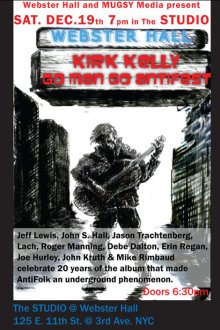
Unfortunately, on the evidence of Go
Man Go (the album), Kelly was too much the sloganeer and tied to the
Dylan's style for anyone to throw accusations of originality at him.
His publishing company was Rambling Woody Zimmerman - and that left
him very little room to move.
Make your way through Talkin’ Train
Blues (with its overt reference Dylan's It Takes A Lot To Laugh (It
Takes A Train To Cry) and a song to union activist Joe Hill (were
there no more contemporary martyrs to the union cause?) and you’d
be forgiven for thinking Kelly didn't have any more to say than the
old troubadour did himself.
He did, but it wasn't much. Corporation
Plow sung over a slack bass played by producer and ex-Violent Femmes
man Brian Ritchie is a good stab at understanding the plight of
farmers during the silent Industrial Revolution of the 20th century,
and in Red Blues he cleverly looks at South America, says he doesn’t
“want to be no communist", and concludes, from the
Reagan-Contra thing that it's better to be a fascist.
But he shoots himself in the foot again
when he writes Marching Off To Gaul, which is little more than Buffy
Saint-Marie's Universal Soldier sung from the soldiers perspective.
Of them all in the neo-Boho movement,
Kelly was the banner waver but a disappointment.
Roger Manning was more problematic. He
delivered his cynical songs like a young Loudon Wainwright (that's
good) and seemed to be the unofficial recorder and in-house
smart-alec of the movement.
On his self-titled debut album (also on
SST like Kelly), he casually name-checked Shocked (and the phrase "go
man go") and was the kind of desperate guy who accuses his
girlfriend of abandoning her country when she says she's leaving him
and going to live in England. His lyrics have plenty of nifty lines
of such self-deprecation.
But he struggles with serious issues,
too.
He’s the one who says he hates boring
lefty folk-singer rhetoric “because it's either ‘no more bombs'
or 'no more nukes' " then grudgingly concedes “they were right
about Vietnam" before flipping over again to conclude “but
then again, they were the only ones (who) gave a damn."
He also gets in a nasty twisted
narrative where a friend's comment about a woman, “I don't want no
girl that wears leather like that," gets the snaky rejoinder
from Kelly, “Me, I don‘t care -- so long as she don’t smoke in
bed.”
Manning is funny, sassy and vicious
where necessary but, like all these neo-folkies (and the old school
come to that), he misses his targets too.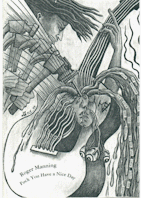
“Sometimes I get the feeling' I just
want to go to France and just hug a cathedral” doesn’t say much
other than something about its own cleverness.
In those feminist-conscious day (post
Sixties feminism, post-punk too) he admits his shortcomings too. A
woman says “seems like I belong nowhere." His reply?
"Nowhere is everywhere – hell,
that was easy”
The tag there shows he's a smart-alec.
Roger Manning is the man and that album
is worthy of re-discovery.
But the star turn was Cindy Lee
Berryhill, whose album Who’s Gonna Save The World is the most
coherent.
A displaced Californian who kicked
along with an electric band for preference, she came off closer to
Patti Smith than Joan Baez and had a finely-tuned sensitivity to
post-feminist consciousness.
Her Damn, I Wish I Was A Man takes an
astute poke at Kerouac (and by trickle-down theory, Kelly) and that
whole "just go" idea. It ain't quite that easy if you’re
a woman, obviously. It’s just boys escaping manhood and
responsibility -- yet again, you can almost hear her sigh.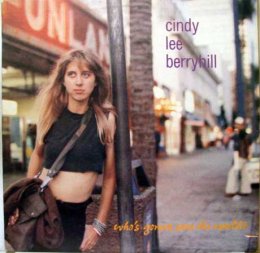
Whatever Works fires a broadside too:
"It's a dirty job and some Ivy League white male’s got to do
it, like travel, speak foreign . . .”
She knows her targets -- folkies who
write on notepads in nice apartments aren't immune either -- and she
seldom misses.
Lyrically she's a heavyweight compared
with Kelly and Manning. She takes on heroin (Steve on H with a
powerful free-form Patti Smith improv) and a lot of tough-minded
songs about young women whose dreams are betrayed until they are
“over the hill at 21 . . . the anvil fell, went straight to hell, I
had to get a job."
She puts herself into any place, be it
a young girl's heart or a garage band ("they met at a friends to
the sounds of Johnny Rotten") and comes through the fire
unscathed.
Of all the neo-Bohos – and there were others – she’s the one to hear, and by some irony she sings Kirk Kelly‘s best song, This Administration.
You sense from Go Man Go that Kelly would have hashed it clumsily.
He was wise to toss it to Berryhill.
Cindy Lee Berryhill is still out there (see clip below) and still has something to say.
But there is a freshness, anger, cynicism-with-humour on Who's Gonna Save the World which makes it worthy of a re-discovery.
She's a powerhouse.
So good she probably wasn't even a folkie - if you get
my drift.

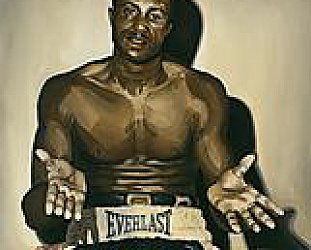
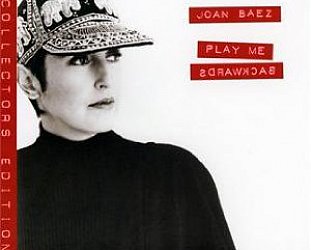




post a comment